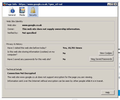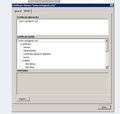
Connection reset while page loading on all https sites
I have a 'creeping' failure problem - at first it was just on my accountant's website, but it seems to be spreading to other sites. The common factor is that they are all 'secure' websites - their urls all begin with https. Instead of the website, I get a page saying "Secure connection failed. The connection to the server was reset while the page was loading". I can still acces the websites using my Linux Ubuntu machine, but it's slow and clunky - it's an old machine with limited memory - but I think this means that it's not related to my ADSL router. I don't know if the two are related, but this problem began on the same day as my Thunderbird stopped loading remote images following an update, even though remote images are enabled explicitly.
Chosen solution
I missed your above reply.
The certificate is issued by DIGITALMARKETRESEARCHAPPS PTY LTD
I found an older thread about this:
Read this answer in context 👍 1All Replies (13)
Assuming the server's not just overly busy, the connection reset message often means that Firefox and the server could not agree on proper parameters for the secure connection. That is unusual; it should be very rare to have that problem with well-run sites.
Your add-on list mentions an AVG extension. Assuming you run AVG, could you check its various settings (I mean outside of Firefox) to try to disable it from filtering your Firefox browsing to see whether that makes any difference?
Also, could you test in Firefox's Safe Mode? In Safe Mode, Firefox temporarily deactivates extensions, hardware acceleration, and some other advanced features to help you assess whether these are causing the problem.
If Firefox is not running: Hold down the Shift key when starting Firefox.
If Firefox is running: You can restart Firefox in Safe Mode using either:
- "3-bar" menu button > "?" button > Restart with Add-ons Disabled
- Help menu > Restart with Add-ons Disabled
and OK the restart.
Both scenarios: A small dialog should appear. Click "Start in Safe Mode" (not Refresh).
Any improvement? (More info: Diagnose Firefox issues using Troubleshoot Mode)
I closed the AVG extension, and started Firefox in safe mode, but the problem persists.
Can you check for any filtering that AVG does externally to Firefox. Sorry I don't know the details.
I have disabled AVG completely, although the latest update doesn't have any controls, just adverts for extra paid-for options, so I disabled it by stopping the processes. The latest problem is that mozilla support forum pages only display as text, and almost every site I visit it blocked because of certificate problems. This includes Google! Maybe it's time to remove Firefox and re-install it?
Phil16v said
The latest problem is that mozilla support forum pages only display as text, and almost every site I visit it blocked because of certificate problems. This includes Google! Maybe it's time to remove Firefox and re-install it?
Don't bother removing and reinstalling. What you're seeing is normal where there is a "man in the middle" of your connection. Let's see whether we can figure out who it is.
On this site, can you view the certificate and compare with the attached, which is what I see? In particular, what "Issuer" do you have listed, and are there any unexpected ones in the certificate hierarchy?
To view the certificate, either:
- right-click (on Mac Ctrl+click) a blank area of the page and choose View Page Info > Security > "View Certificate"
- (menu bar) Tools > Page Info > Security > "View Certificate"
- click the padlock or "i" icon in the address bar, then the ">" button, then More Information, and finally the "View Certificate" button
Thanks.
The Google page doesn't show a certificate. I've attached a picture of the page and the security info. Racing Post also fails, and that one has a certificate, but it looks kosher to me.
If the SSL error code is linkified on the error page then please click this button to expand the certificate code and paste this code in a reply. That will allow us to decode the base64 certificate data. If you can open the certificate viewer then please post a screenshot that shows the issuer of the certificate.
It doesn't look like the pictures got attached. I've copied them to my Linux machine which renders the support website correctly.
I'm not sure what Cor-El means, but I've looked at the Racing Post certificate information and noticed that it can be exported, but as the export isn't an image, I don't seem to be able to upload it. If it would be of any use, maybe you could tell me where to put it?
Ok. I've realised what Cor-El means. The data from the SSL error code is as follows:
Peer's Certificate issuer is not recognised.
HTTP Strict Transport Security: false HTTP Public Key Pinning: false
Certificate chain:
-----BEGIN CERTIFICATE----- MIIDWjCCAsegAwIBAgIQMBrozEzQMbxJJzDZgztyqDAJBgUrDgMCHQUAMIGEMSow KAYDVQQLEyFESUdJVEFMTUFSS0VUUkVTRUFSQ0hBUFBTIFBUWSBMVEQxKjAoBgNV BAoTIURJR0lUQUxNQVJLRVRSRVNFQVJDSEFQUFMgUFRZIExURDEqMCgGA1UEAxMh RElHSVRBTE1BUktFVFJFU0VBUkNIQVBQUyBQVFkgTFREMB4XDTE3MDUwMjIwMDkz M1oXDTM5MTIzMTIzNTk1OVowdTEqMCgGA1UECxMhRElHSVRBTE1BUktFVFJFU0VB UkNIQVBQUyBQVFkgTFREMSowKAYDVQQKEyFESUdJVEFMTUFSS0VUUkVTRUFSQ0hB UFBTIFBUWSBMVEQxGzAZBgNVBAMTEnd3dy5yYWNpbmdwb3N0LmNvbTCBnzANBgkq hkiG9w0BAQEFAAOBjQAwgYkCgYEAqnICwMZzG+t9hUxjLYdjVAmsWmYBfGKND2Cr DCd+KqN2AwzTnclZk6wYjxCJ9MDx2ppfa0rccu1y0nMo7pnR2BpiVDyIvBAuCPUp pK/s2Ul1IWjyFBdmZZpw2Z0BVZ86CT7LxtZ9bvZXVD+0Huse0zYJEQAlhnrbZZpj qJxv+4UCAwEAAaOB4jCB3zAMBgNVHRMBAf8EAjAAMBMGA1UdJQQMMAoGCCsGAQUF BwMBMIG5BgNVHQEEgbEwga6AEMXAtfbJIWUPPyFDggFVSr6hgYcwgYQxKjAoBgNV BAsTIURJR0lUQUxNQVJLRVRSRVNFQVJDSEFQUFMgUFRZIExURDEqMCgGA1UEChMh RElHSVRBTE1BUktFVFJFU0VBUkNIQVBQUyBQVFkgTFREMSowKAYDVQQDEyFESUdJ VEFMTUFSS0VUUkVTRUFSQ0hBUFBTIFBUWSBMVESCEMmOQgTBb0O+Rwb+CBv8Wtww CQYFKw4DAh0FAAOBgQBLlYiuA9AaeaS6/30ldpPDjc6NUqaOn5+Go4PkWXEWBR02 4DEAeVs5xObAMplmWdE6FxnwqPtG4Z4oEnjeURYQmQJSsI9OcxB4R+W6wHzfkwNb mBe969wxS7OuQfArEBX+7rVnFmWnFJ+GoZrJYtgcXr3J0GmaqRtLvK5HDaQ0nQ==
END CERTIFICATE-----
Modified
You can click the Advanced button in the second screenshot to expand the error message. If that shows a specific (blue) error message then you can click this item. In the third screenshot you can select the issuer, so we can see this data. You should also see this issuer data on the first screen of the certificate viewer (General pane).
Chosen Solution
I missed your above reply.
The certificate is issued by DIGITALMARKETRESEARCHAPPS PTY LTD
I found an older thread about this:
Uninstalling the e-Rewards app seems to have restored normal operation. Not only can I now get into all my favourite websites, but it's also allowed the remote images in Thunderbird to be loaded. I visted the e-Rewards website and left them a message asking why this hasn't been fixed yet. I won't hold my breath! Thanks to jscher2000 and Cor-El (I'm sure that's an old Martian name....)




